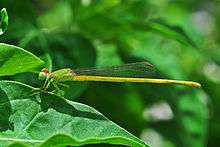Ceriagrion coromandelianum
Ceriagrion coromandelianum[2] is a species of damselfly in the family Coenagrionidae. it is commonly known as coromandel marsh dart[3][4] and yellow waxtail. This species can be found in South Asian countries such as: India, Sri Lanka, Pakistan and Nepal.[1][5]
| Ceriagrion coromandelianum | |
|---|---|
 | |
| male | |
| female | |
| Scientific classification | |
| Kingdom: | Animalia |
| Phylum: | Arthropoda |
| Class: | Insecta |
| Order: | Odonata |
| Suborder: | Zygoptera |
| Family: | Coenagrionidae |
| Genus: | Ceriagrion |
| Species: | C. coromandelianum |
| Binomial name | |
| Ceriagrion coromandelianum (Fabricius, 1798) | |
Description and habitat
It is a medium sized damselfly with yellowish green eyes. Its thorax is olive green above and yellowish green on the sides. Its abdomen is yellow. Its anal appendages are citron-yellow or ochreous, the inferiors tipped with black. The superiors are sub-quadrate as seen from above, with the corners gently rounded. The inferiors are sloped strongly upwards, broad at base, then tapering rapidly to an acute point. Female is more robust and dull colored. Its thorax is more greenish and abdomen is golden yellow to brown.[6]
It breeds in weedy ponds, ditches, and rice fields.[6][7][8][3][4]
See also
- List of odonates of India
- List of odonates of Sri Lanka
- List of odonata of Kerala
References
- "Ceriagrion coromandelianum". IUCN Red List of Threatened Species. 2009: e.T167444A6349205. 2009. doi:10.2305/IUCN.UK.2009-2.RLTS.T163724A5641903.en.{{cite iucn}}: error: |doi= / |page= mismatch (help)
- Martin Schorr; Dennis Paulson. "World Odonata List". University of Puget Sound. Retrieved 12 Oct 2018.
- "Ceriagrion coromandelianum Fabricius, 1798". India Biodiversity Portal. Retrieved 2017-02-28.
- "Ceriagrion coromandelianum Fabricius, 1798". Odonata of India, v. 1.00. Indian Foundation for Butterflies. Retrieved 2017-02-28.
- K.A., Subramanian; K.G., Emiliyamma; R., Babu; C., Radhakrishnan; S.S., Talmale (2018). Atlas of Odonata (Insecta) of the Western Ghats, India. Zoological Survey of India. pp. 153–154. ISBN 9788181714954.
- C FC Lt. Fraser (1933). The Fauna of British India, including Ceylon and Burma, Odonata Vol. I. Red Lion Court, Fleet Street, London: Taylor and Francis. pp. 315–316.
- C FC Lt. Fraser (1924). A Survey of the Odonate (Dragonfly) Fauna of Western India and Descriptions of Thirty New Species (PDF). p. 491.
- Subramanian, K. A. (2005). Dragonflies and Damselflies of Peninsular India - A Field Guide.
External links
![]()
![]()
